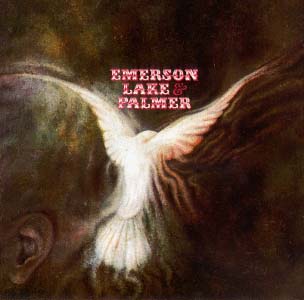- Emerson, Lake & Palmer (album)
Infobox Album | Name = Emerson, Lake & Palmer
Type =Album
Artist =Emerson, Lake & Palmer

Released = November, 1970 (UK)
January, 1971 (US)
Recorded = July to September 1970,Advision Studios
Genre =Progressive rock
Length = 41:13
Label =Island Records (UK)
Cotillion Records ,Rhino Records (US)
Producer =Greg Lake
Last album =
This album = "Emerson, Lake & Palmer"
(1970)
Next album = "Tarkus "
(1971)
Reviews =
*Allmusic Rating|4.5|5 [http://www.allmusic.com/cg/amg.dll?p=amg&sql=10:z9m8b5b4tsqk link]"Emerson, Lake & Palmer" is the debut
album of Britishprogressive rock bandEmerson, Lake & Palmer , released in 1970 in the United Kingdom and January 1971 in the United States.As a first album from the newly-formed supergroup the influences they brought with them are clear in the mix of instrumental and vocal pieces. The front cover of the album depicts a fluttering white bird with a human ear in the bottom left corner (the bird's left wing outlines the back of the head to which the ear is attached, the other half of which is on the back of the album.)
The album is not a unified band effort as a whole; only the first track features credits for all three band members. The remainder are essentially solo pieces. "Take a Pebble" and "Lucky Man" are
ballad s byGreg Lake , precedents to those he would produce on subsequent albums (notably, "C'est La Vie" from "Works Volume I " and "Still...You Turn Me On" from "Brain Salad Surgery ").Carl Palmer 's solo spot, "Tank", is intended to showcase his virtuoso drumming style. It also featuresKeith Emerson onclavinet and synthesizers.Going beyond the incorporation of classical music influences, including using complex
time signature s and harmonies and symphonic-type structures which helped to give them their unique sound, the band used lengthy note-for-note extracts from composers including Bach, Janáček, and Bartók.Although the composition of the first track, "Barbarian", is attributed to the three band members, it is effectively an arrangement for rock band of Bartók’s 1911 piano piece, "Allegro Barbaro". The third track, "Knife Edge", is based on the first movement of Janáček’s "Sinfonietta" (1926) with an instrumental middle section that includes an extended quotation from the Allemande of
Johann Sebastian Bach 's first French Suite in D minor,BWV 812, but played on an organ rather than clavichord or piano. None of these quotations were attributed on the original album release."Lucky Man", the album's single which charted on both sides of the Atlantic, was originally recorded to fill leftover space at the end of the album at the request of the record company. It was written by a teenage Greg Lake for acoustic guitar long before he joined the band (when Lake was at 12 years of age), and was not well received by Emerson or Palmer. However, the two agreed to cooperate on what was to become one of the band's most commercial and accessible tracks. At Lake's request, Emerson played a solo on his
Moog synthesizer at the close of the track. On the band's recent DVD "Beyond the Beginning", Emerson explains how the solo was entirely improvised. It was recorded in one take. It represented a landmark in popular music and a defining moment in Emerson's career, despite his insistence that it is below his usual standard. The guitar solo is played by Lake and overdubbed, as indeed were guitar solos from later tracks like "Tarkus" and "Karn Evil 9". In live performances, Emerson plays a version of the guitar solo onHammond organ .The album peaked at #18 on the
Billboard 200 . "Lucky Man" reached #48 on theBillboard Hot 100 .Track listing
ide one
#"The Barbarian" (Béla Bartók, arr. Emerson, Lake & Palmer) – 4:27
#"Take a Pebble" (Lake) – 12:32
#"Knife-Edge" (Leoš Janáček & J. S. Bach, arr. Emerson, Lake & Fraser) – 5:04ide two
#"The Three Fates" (Emerson) – 7:46
#*"Clotho " "Royal Festival Hall Organ"
#*"Lachesis" "Piano Solo"
#*"Atropos " "Piano Trio"
#"Tank" (Emerson & Palmer) – 6:49
#"Lucky Man" (Lake) – 4:36Personnel
*
Keith Emerson : organ,synthesizer ,piano ,clavinet , keyboard,Hammond organ ,Moog synthesizer ,Royal Festival Hall organ
*Greg Lake : acoustic guitar, bass,electric guitar , vocals
*Carl Palmer : drums, percussionProduction
*Producer: Greg Lake
*Engineer:Eddie Offord
*Arranger: Emerson, Lake & Palmer
*Director: Emerson, Lake & Palmeringles
* Lucky Man / Knife-Edge
Wikimedia Foundation. 2010.
